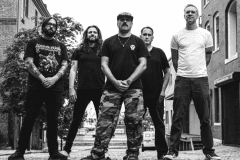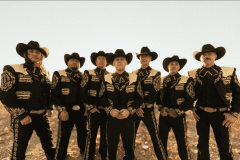Interview: Stephen Christian of Anberlin
Anberlin’s music evokes a myriad of emotions with its warm guitar rapture and vocalist Stephen Christian’s inimitable and infectious cadence. While lesser bands have flared out, our barely resemble their former selves, the band have maintained their infectious sound, never chasing the current trends to a pay day, as well as the majority of their original core unit for ten years. This speaks volumes about the kind of band they are, and has paid dividends in the long run. Their sixth full-length, Vital, which is being called their most aggressive to date, is the band’s third for Republic Records and was released October 16. All of this is in time for a fall headlining run, as well as a run with alternative rock legends The Smashing Pumpkins.
Ghettoblaster caught up with Christian while he prepared for the band’s big fall and winter to ask some questions about their new album, their long-running tradition of covering ‘80s new wave heroes, being honest, and the band’s charity and community outreach activities. This is what he told us…
The publications that I write for are based out of Ohio and I had the opportunity to see Anberlin play on what must’ve been one of you very first tours at Elbo’s in Dayton, Ohio, in around 2002 or 2003. Do you remember that show at all?
Oh wow. That’s incredible. I absolutely remember that. That’s hilarious. That is a pretty small venue out there if I remember correctly. That’s really cool.
Prior to the release of Dark Is The Way, Wikipedia said that you guys had sold 700,000 albums. Have you hit the one million mark and is that even the kind of milestone that you’d measure your band’s success with?
Um, well we are narrowing in on it. I really haven’t checked lately. I think we’re right around 900,000 thousand. That’s just a guess. I would lie if I said that was no big deal. But for me I think it will be. It’s not a big deal for me now, but when I’m 60 years old or so and am telling my grandchildren about my exploits around the world and to be able to tell them I sold a million records would be quite a big deal I think. Especially because by the times my kids and grandkids are around, there may be a little less of a record industry to speak of. I think by that time, a million will sound like a lot to them. So, I think it will be a milestone. I don’t think I’ll appreciate it as much now as I will appreciate it down the road.
We’ve seen a lot of bands lately doing anniversary shows where they play an earlier album in its entirety for nostalgia’s sake or cash grabbing purposes I guess. With Blueprints coming up on its 10th anniversary, can we expect to see you guys do a run of Blueprint s-centric shows in 2013?
Honestly, and this is nothing against people who do those kinds of shows, but that doesn’t seem like Anberlin. We’re still a forward projectile. We keep getting closer and closer to number one on the Billboard charts, we keep touring and opening up new markets, we are still selling out venues. Nostalgia seems to be about living in the past, and it always seems like Anberlin was been on a forward projectile.
A cash grab also doesn’t sound like Anberlin. We’ve had many, many opportunities in the past to do commercials, tours with such and such a band, and they were going to offer larger dividends and more money, but we refused them because they didn’t line up with our goals, or what we wanted to do, or where we want to see the band going. So neither of those sound like Anberlin, and that’s why we have not, and most likely, I’m 99 percent sure, we’ll never do something like that.
In 10 years you’ve probably outlived the majority of your peers and those who are still around have seen lineup changes and maybe even barely resemble who they were ten years ago. Anberlin has been an anomaly in that way in that you’ve maintained most of the core members and integrity of the band since day one. That’s unheard of for a band who’ve done as much as you have. How do you manage to avoid the pitfalls of burning out on each other, or having personality conflicts that would threaten the lifespan of the band?
75 percent of being in a band is what you do off stage. Only 25 percent is what you do on. You can be an incredible musician, but if you have a bad attitude or treat the fans bad, or are in it for sex and drugs you’d never fit in Anberlin. We’ve been friends for years. We were friends way before we started a band together. We’re like brothers; brothers who when they see each other immediately pick up where we left off. We are friends on and off stage. A lot of bands get together to form a band. We were a bunch of friends looking for a way out of a small town. I think that’s what it is. If we weren’t friends offstage, this would be a lot harder. We would have broken up years ago. But the fact is that I love each and every one of the guys in the band.
One of the things that struck me about the band all those years ago was not just the strength of your original material, but also that you were covering ‘80s songs and completely reinventing them. What is it about those songs and what they were about that makes them a natural fit for Anberlin?
I think we’ve always been attracted to the new wave sound simply because of the simplicity and the innocence that those songs offered. A lot of bands don’t draw their influence from those ‘80s bands, but we do. I love the catchy hooks that get stuck in your head. And I love the mix of innocence and darkness that bands like New Order, Joy Division, Morrissey and The Smiths bring. A lot of those things combined are a summation of Anberlin. I’ve always been attracted to those kinds of bands, like The Cure and Depeche Mode. They were kind of the foundation of Anberlin inspiration-wise. And songwriting-wise we draw a lot of inspiration from them as well.
As a musician, I think it is important to avoid the current radio charts or people that you tour with to draw inspiration from in order to avoid sounding like everything else. If you are able to look back in time and draw inspiration from blues, or jazz, or from Led Zeppelin of the Beatles, that is a much better place to start from. You don’t want to bite them or rip them off, but when you are searching for the foundation for a band it is good to go back in time rather than to mimic or copy what is currently happening.
You guys used Aaron Sprinkle for all the Tooth and Nail albums and when you signed to Universal you worked with some incredible people in Neal and Brendan. Aaron is the producer on Vital though, right?
When we did those other albums we went with Neal Avron and Brendan O’Brien, and now we’re back to Aaron Sprinkle. We feel like we learned so much from those other producers, and we wanted to bring it back to the original sixth member of Anberlin, which was what we always considered Aaron Sprinkle to be. It felt like coming home. Like reuniting and reacquainting with an old friend. We picked up where we left off. He absolutely crushed this record. He did an amazing job. Even with small things like the song “Innocent,” which we didn’t even feel like was going to go on the record. Aaron got his hands on it, we worked it out, and now it is one of my favorite songs on the entire record.
For New Surrender you had some songwriting help from folks like Butch Walker, Dan Wilson and Mitch Allen. Did you enlist any help on this record?
Again, I feel like that was my college record, or my master’s degree record. Neal Avron taught me more about songwriting than any other producer ever. And in working with other amazing songwriters I got to see how they do this, how their minds work, what their operation of trying to go through a song was. It’s hard. You can sit there and look at the guitarist and say, “What do you think of this?” But as a singer or lyricist, having the opportunity to look across the table and asks someone’s opinion was incredible. I’d never worked with another singer or lyricist before. It was incredible to be able to learn from all of these outstanding songwriters and then take it back into the production and work it out.
This time I did not get the chance to songwrite with anyone, simply because when you feel like the creative juices are flowing and everything is firing on all cylinders it is nice to be able to work it out on your own.
Early reports on Vital is that it is your most aggressive record to date. Are there catalysts at working the world that you are responding to, or is that aggression coming from a more personal place?
It is a response to sitting down and figuring out why am I in the band? What makes this go? The reasoning that I kept coming back to was that this is all about that hour that I’m on stage. It is not about fame or notoriety that everyone else perceives that rock and roll is. It is about being on that stage, looking into the crowd, and seeing people screaming along with veins popping out of their necks. It is about them swaying back and worth and jumping on top of each other. That is my favorite part of the set. So why not write songs for that? Why not write songs that push that momentum even further when we are doing a set live? That is what I focused on. I focused on the passion. That’s the reason why I’m still in the band Anberlin.
I understand that you are swinging for the fences musically, but in the lyrics are there things that you are addressing specifically? Are you worrying about the problems of the world, or addressing more personal things?
I think it is a little bit of both. I’ve read a lot of Charles Bukowski and I think that the biggest thing that he has taught me is that open, honest, gross truth, even if it is disgusting or doesn’t feel right, is the best possible way to go. The idea of being blunt, saying exactly how something feels – not a heart on a sleeve, but more like laying guts out on a table was where I wanted to go with this record. I wanted to look at the world around me and just lay it on the line, whether it felt good or not. I addressed things like war and violence, and the culture that we’re living in currently, and went at them with this in mind. I thought, hey I’m going to exploit every feeling, even if it doesn’t feel good, I’m going to deliver my perception of truth.
Anberlin has always been pretty outspoken about using the band as a platform for raising awareness about social issues. Are you still involved in charity organizations, and if so which ones?
The one that we’re most focused on now is an incredible organization called downtime who takes musicians who have time before the shows, or a day off, and gets them involved with the local communities that we are about to play in. So instead of doing meet and greet, we show up to a town, a place like Ohio, and say were working with somebody like Habitat for Humanity and invite people to come down to help us build a garden, or build a house together. We’ve done that in several locations.
We’ve also worked with an incredible, beautiful organization called Dare With Care out of Boulder, Colorado, who works to assist children who have cancer. That program gets them groceries, feeds them, clothes them, and we went there, took boxes, and invited 20 or so kids to spend time with us doing this and then when we leave we hope that those kids will get involved with a charity in their town that they can get involved with on a regular basis.
So yes, we are involved in social justice and organizations that help us to leave the world a better place than we found it.
You’re upcoming dates include a support run with Smashing Pumpkins and I imagine doing a support slot with a band as high-profile as they are makes writing a set list tricky for you guys with your own headlining stuff on the horizon and a new record under your belts. How will those setlists differ?
I feel like that support run will open us up to a lot of folks that we don’t usually play for. They are such a band with this amazing palate of colors in their music. It soars, and is all over the place. One second it is crunchy and euphoric and the next second it is ominous and dark. And I feel like that really opens us up to playing stuff we don’t normally play. We want to show people what we are capable of and that we should be their second favorite band behind Smashing Pumpkins.
For our headlining set, we’ll feature some older stuff from Blueprints for the Black Market, or Never Take Friendship Personal and Cities. I hate going to a show where the band has just come out with a new record and all they play is new stuff. I’m like, “Your CD just came out last week. Don’t expect me to sing along or know all of your songs yet.” So we definitely want to make sure that we play a lot of songs from each of our records, where with Smashing Pumpkins we’ll focus more on the new record and introducing ourselves to this crowd for the first time.
Now Anchor & Braille had a record drop this year too. Are there things that you get from that that you don’t from Anberlin?
Absolutely. Anberlin gives me raw energy. It is 110 percent all the time. With Anchor & Braille it is a lot more intimate. The shows are smaller, the crowd is right there in my face, and it feels like I’m starting a whole new band. Which I am. But there’s a connection with the crowd there that feels personal, and vulnerable. With Anberlin, it is a giant machine running on all cylinders, at all times. There are advantages of both. There are disadvantages of both. Sometimes with Anberlin I feel disconnected from the crowd, and with Anchor & Braille I do feel a little more connected. But with Anberlin I am into this mob mentality of pure energy, and that’s not something I can get from Anchor & Braille. So they both have advantages and shortcomings, but they both have a special place in my heart. And there’s never been a conflict, because Anberlin knows they are my number one priority.
On a personal note, have you been working on another book?
I have. I’ve been working on two. But I’ve come to a point where this year has been so busy with both records coming out that I haven’t had much time to address them. But trust me, it is constantly in the back of my head. I always have my mind blown when people approach me and say that my book is their favorite book. I hope it’s not the only book they’ve ever read (laughter). But it is cool to be some small part of people’s lives in that way.








Social Media